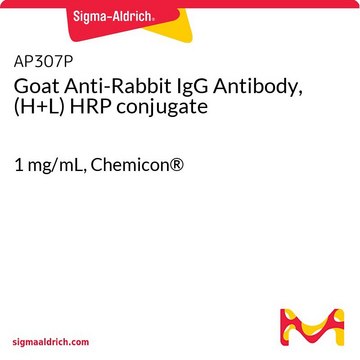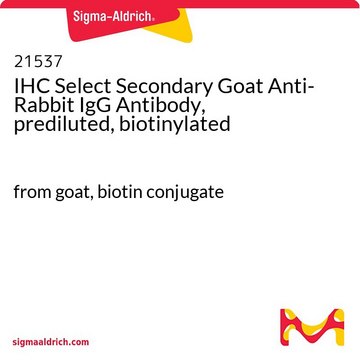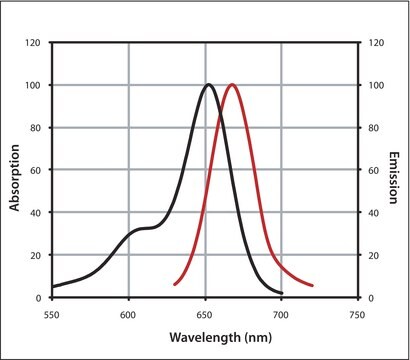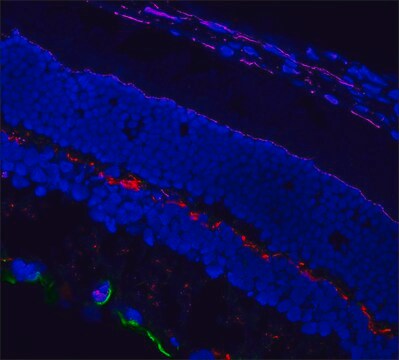AP510
Sheep-Anti-Rabbit IgG secondary Antibody
2 mg/mL, Chemicon®
Sign Into View Organizational & Contract Pricing
All Photos(1)
About This Item
UNSPSC Code:
12352203
eCl@ss:
32160702
NACRES:
NA.46
Recommended Products
biological source
sheep
Quality Level
antibody form
purified antibody
antibody product type
secondary antibodies
clone
polyclonal
species reactivity
rabbit
manufacturer/tradename
Chemicon®
concentration
2 mg/mL
technique(s)
ELISA: suitable
shipped in
wet ice
target post-translational modification
unmodified
Related Categories
General description
Immunoglobulin G (IgG) is part of the family of glycoprotein immunoglobulins which stage immune responses against pathogenic organisms. IgG contributes to the immune response by mobilizing innate immune effector cells and inducing and pro-inflammatory responses. Such proinflammatory responses are mediated by Fcg receptors which interact with sialylated Fc fragments on IgG molecules.
Specificity
This antibody reacts with rabbit IgG and rabbit IgG (Fc) as demonstrated by ELISA. Minimal cross-reactivity detected with Human IgG and Rabbit IgM; little to no cross-reactivity detected with Mouse IgG, Rat IgG, Chicken IgY, Guinea Pig IgG, and Hamster IgG.
Immunogen
Rabbit IgG
Application
Research Category
Secondary & Control Antibodies
Secondary & Control Antibodies
Research Sub Category
Isotype Control Antibodies
Isotype Control Antibodies
Sheep-anti-Rabbit IgG secondary antibody detects level of Rabbit IgG secondary & has been published & validated for use in ELISA.
Quality
Evaluated by ELISA against Human IgG, Mouse IgG, Rat IgG, Chicken IgM, Goat IgG, Guinea Pig IgG, Hamster IgG, Rabbit IgG, Rabbit IgG (Fc), and Rabbit IgM.
ELISA Analysis: A representative lot detected Sheep Anti-Human IgM, (Fc) in ELISA. (1:200 - 1,000 recommended dilution.)
ELISA Analysis: A representative lot detected Sheep Anti-Human IgM, (Fc) in ELISA. (1:200 - 1,000 recommended dilution.)
Target description
150 kDa calculated
Physical form
Format: Purified
Octanoic Acid and Ammonium Sulfate cut. Depleted against Goat IgG and Rabbit IgM
Purified sheep polyclonal in buffer containing PBS with 0.05% sodium azide.
Storage and Stability
Stable for 1 year at 2-8°C from date of receipt.
Analysis Note
Control
Human IgG, Mouse IgG, Rat IgG whole molecule, Chicken IgM whole molecule, Goat IgG whole molecule, Guinea Pig IgG, Hamster IgG whole molecule, Rabbit IgG, Rabbit IgG (Fc), and Rabbit IgM whole molecule
Human IgG, Mouse IgG, Rat IgG whole molecule, Chicken IgM whole molecule, Goat IgG whole molecule, Guinea Pig IgG, Hamster IgG whole molecule, Rabbit IgG, Rabbit IgG (Fc), and Rabbit IgM whole molecule
Legal Information
CHEMICON is a registered trademark of Merck KGaA, Darmstadt, Germany
Disclaimer
Unless otherwise stated in our catalog or other company documentation accompanying the product(s), our products are intended for research use only and are not to be used for any other purpose, which includes but is not limited to, unauthorized commercial uses, in vitro diagnostic uses, ex vivo or in vivo therapeutic uses or any type of consumption or application to humans or animals.
Not finding the right product?
Try our Product Selector Tool.
Storage Class Code
10 - Combustible liquids
WGK
WGK 2
Flash Point(F)
Not applicable
Flash Point(C)
Not applicable
Certificates of Analysis (COA)
Search for Certificates of Analysis (COA) by entering the products Lot/Batch Number. Lot and Batch Numbers can be found on a product’s label following the words ‘Lot’ or ‘Batch’.
Already Own This Product?
Find documentation for the products that you have recently purchased in the Document Library.
Yu Zhao et al.
Oncology reports, 49(1) (2022-12-02)
Chemotherapy remains one of the most important adjuvant treatments for bladder cancer (BC). However, similar to other malignancies, BC is prone to chemotherapy resistance and only approximately half of muscle‑invasive patients with BC respond to chemotherapy. The present study aimed
Tiansheng Zheng et al.
Frontiers in pharmacology, 12, 737552-737552 (2021-10-08)
Osteoarthritis (OA) is histopathologically marked by extracellular matrix (ECM) degradation in joint cartilage. Abnormal mechanical stimulation on joint cartilage may result in ECM degeneration and OA development. Matrix metalloproteinase 13 (MMP-13) is one of the catabolic enzymes contributing to the
Baiyin Zhong et al.
Journal of Cancer, 13(3), 975-986 (2022-02-15)
Cholangiocarcinoma (CCA) is a type of cancer with a relatively low morbidity, but poor prognosis. Aberrant long non-coding RNA (lncRNA) expression has been observed in the pathological development of CCA. In the present study, lncRNA long intergenic non-protein coding RNA
Jiajun Xu et al.
Oncology letters, 22(3), 651-651 (2021-08-14)
Long non-coding RNAs (lncRNAs) serve an important role in the development of esophageal cancer (EC), which is the eighth most common type of cancer worldwide. lncRNA opa-interacting protein 5 antisense transcript 1 (OIP5-AS1) is associated with human malignancy. However, the
Junying Chen et al.
Bioengineered, 12(2), 10723-10733 (2021-11-10)
RAS p21 protein activator 4 (RASA4) has been recognized as a Ca2+-promoted Ras-MAPK pathway suppressor that inhibits tumor growth. However, the role of RASA4 in cervical squamous cell carcinoma (CESC) remains unclear. The mRNA levels of RASA4 were analyzed using
Our team of scientists has experience in all areas of research including Life Science, Material Science, Chemical Synthesis, Chromatography, Analytical and many others.
Contact Technical Service







